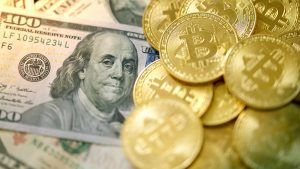A Bipolar World? Searching in Vain for a Dollar Alternative
 The seizure of Russia’s dollar reserves, part of the first wave of sanctions decreed in response to Moscow’s ‘special military operation’ in Ukraine, has a growing legion of pundits wondering if the time has come to look for a new global reserve currency. Some of the wilder suggestions propose a fresh look at China’s renminbi and a renewed appreciation of bitcoin.
The seizure of Russia’s dollar reserves, part of the first wave of sanctions decreed in response to Moscow’s ‘special military operation’ in Ukraine, has a growing legion of pundits wondering if the time has come to look for a new global reserve currency. Some of the wilder suggestions propose a fresh look at China’s renminbi and a renewed appreciation of bitcoin.
The weaponization of the dollar has been noted elsewhere by assorted despots who fear running afoul of Western rectitude. Last week, US Treasury Secretary Janet Yellen added to their concerns during a little-noticed address at the Atlantic Council in Washington when she called for a new Bretton Woods-like global framework and stressed the need to relink trade and values.
Ms Yellen detected a ‘pivot point’ for the global economy with Russia’s invasion of Ukraine and China’s – and thirty other countries’ – refusal to condemn the aggression and join the sanctions regime. The treasury secretary proposed to use US trade policy as an instrument to uphold and further certain principles, including sovereignty and labour rights. She said that trade should not merely be free but also secure.
Friend-Shoring
In her address, Ms Yellen rallied against countries leveraging their raw materials and technology for geopolitical advantage. She said the US would henceforward encourage the ‘friend-shoring’ of supply chains, rerouting them away from authoritarian states to ‘trusted countries’ that share norms and values.
Knowingly or otherwise, Ms Yellen seeks to bury the neoliberal world order and set the stage for a, presumably, monumental clash of civilisations. Neoliberalism’s premise was, after all, the idea that trade brings shared prosperity to all by connecting markets. The need to protect and expand that prosperity would, so it was thought, further the cause of freedom and democracy.
A term often misunderstood and widely despised, neoliberalism forms the root of the European Union – its greatest achievement. By creating supranational institutions that break down national barriers to the free exchange of goods, services, capital, and labour, the European Union, and its predecessor (EEC – European Economic Community), managed to stabilise and bring together and unite a continent of bickering and warring tribes.
More recently, in the late 1990s, a similar approach sought to bring China in from the cold. The country was shoehorned into the World Trade Organisation (2001) in the full expectation that the accession would presage China’s embrace of democracy. The thinking was not without logic: after all, no country has benefitted more from the neoliberal world order than China which owes its rapid ascendancy – and its riches – to free trade and open markets.
China graciously accepted the gift but of course kept its own counsel, leading to the present ‘one world, two systems’ conundrum. Ms Yellen acknowledged as much when she noted that China maintains practices that “unfairly damage US national security interests.” The problem occurs when real or imagined domestic concerns and sentiments outweigh the benefits of neoliberalism. Brexit is the prime example of such a gap.
In her Washington address, Ms Yellen expressed the hope that the world doesn’t end up with a bipolar system. However, that horse seems to have bolted. The West can only try to slide the barndoor shut as, indeed, it did on Russia.
Going Ballistic
The war in Ukraine has sparked a display of transatlantic unity and resolve not seen in decades. The US and its European allies went ballistic to remind all and sundry that they still rule the global roost. Some may well argue that the flexing of the neoliberal’s financial muscle represents nothing more than a dead cat bounce as the epicentre of power has long since moved east. And fair enough: it is one thing to shut out Russia – an economic nincompoop by any measure – but quite another to take on, say, China or India.
The ’other side’ of the bipolar world is unlikely to be impressed. Working quietly and leveraging their considerable economic heft, China, and its ‘non-aligned’ hangers-on, are looking for ways to deprive the West of its mightiest weapon – the dollar.
One upon a time, a global reserve currency had to meet at least three basic requirements:
- Its issuer needed to be a major, if not the dominant, trade power, and
- Enjoy (macro)economic stability to inspire confidence, and
- Have deep and liquid financial markets.
Prior to World War I, sterling was the undisputed reserve currency of the world with British gilt-edged securities the near-perfect safe asset. Backed up by an empire of unmatched size and scope, fiscal prudency, rule of law, and gunboat diplomacy in times of trouble, sterling and gilts were the preferred – and arguably only – safe way to store value.
Two world wars ended British financial pre-eminence and knocked sterling off its lofty perch, a fall initiated when Great Britain was forced to let go of the gold standard on the eve of the Great War (1913) and the Bank of England imposed exchange controls after a run on sterling which deteriorated the bank’s liquidity position. Subsequently, the US dollar – then still on the gold standard – took over as global reserve currency, a position it managed to preserve even after President Richard Nixon severed the link between dollars and gold in 1971 to help finance the Vietnam War.
The desire to dump the dollar as reserve currency is quite understandable. If the issuer can seize savings at will, an alternative vehicle for the storage of value is needed. With well over $3 trillion in reserves, China is understandably worried. However, its renminbi remains a poor alternative to the dollar. Notwithstanding attempts to tinker with the premises of a global reserve currency, the classic requirements are still in place – and for good reason.
Dreams of Renminbi
Of the three basic requirements for the role, China only meets one (major trade power). However, the country’s financial system is notoriously weak and relatively undeveloped. The renminbi is not fully convertible, and China lacks open and liquid financial markets. The Chinese government also fails to inspire confidence as it is liable to suffer bouts of irrational anger when ‘offended’ by those deemed unfriendly to the country’s interests. The best Beijing can hope for is to create a ‘walled garden’ for the renminbi with its closest like-minded allies. However, any interaction with the West will require settlement in dollars, euros, or yens.
Bitcoin, the great hope of a collective nostalgic for value-backed currencies (as opposed to fiat money), is even less likely to become a reserve currency. For all its wizardry and technological prowess, bitcoin is hopelessly cumbersome in daily – not unlike gold. Moreover, the market ‘value’ of all cryptocurrencies together amounts to no more than $2 trillion, or just 16% of the world’s currency reserves. Finally, sanguine bitcoin fans conveniently forget that cryptocurrencies are neither backed by gold or any other commodity, or by the issuer’s ability to raise taxes – the hallmark and strength of fiat money.
In the long run, and making all the right moves, China’s renminbi may well replace the US dollar as the world’s reserve currency. However, and paradoxically, those right moves would require China to shift towards the neoliberal model which defeats the purpose of the exercise.
Until such a time, the dollar is here to stay and only rogues need fear that. US treasury secretary Janet Yellen can perhaps find some solace in the fact that the bipolar world appears near but may yet turn out to be a mirage. The horse that bolted can be lassoed and ushered back home.
You may have an interest in also reading…
Is it Time to Put AI in Charge of Pricing Strategies? Most Firms Seem Hesitant to Take the Leap
Despite corporates enthusiasm for AI, its use in pricing strategies — using algorithms to determine optimal prices for goods and
In Search of Lost Time: Mapping the Chip on Russia’s Shoulder
Before the shooting starts anew, let’s mention the war. Not the war we know, but the one that lives on
Behold the New War: Same as the Old War, but it Comes with an App
On the battlefields of Ukraine, massive military kit is trumping technology, reports Wim Romeijn. On the undulating plains of eastern

















































































